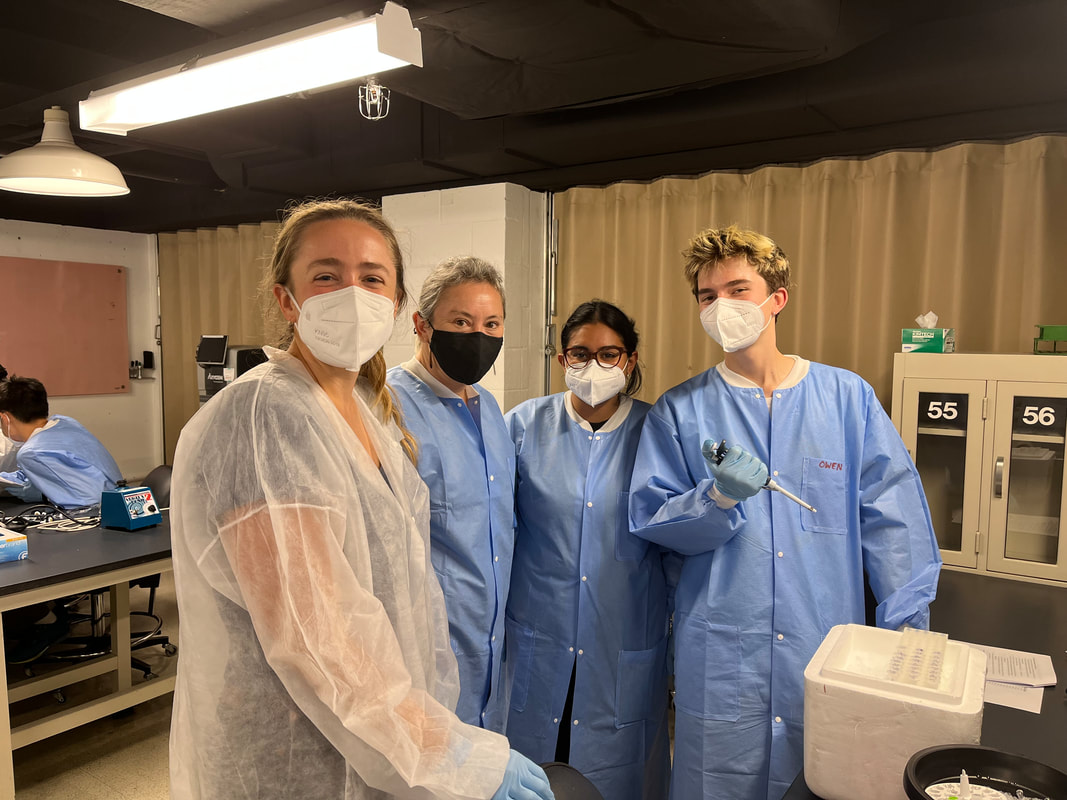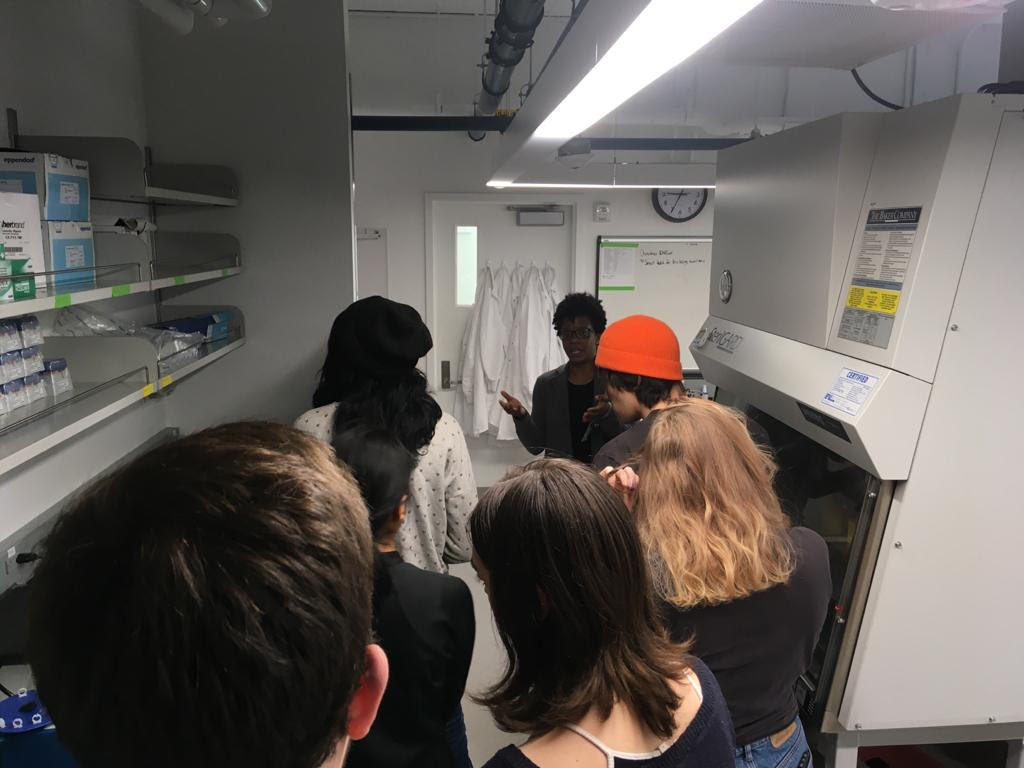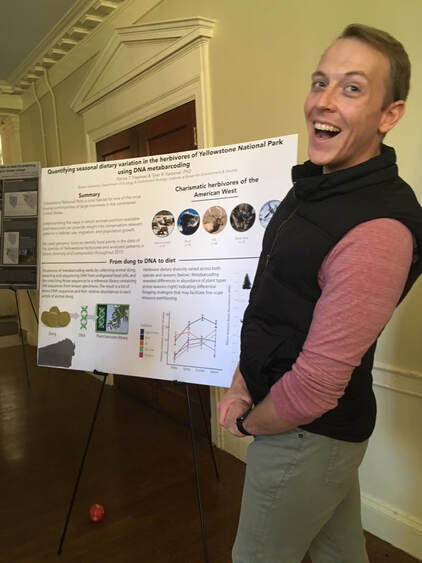|
We were honored to have Haldre Rogers join the lab during her visit this week. We are huge fans of Haldre -- not only did she give a phenomenal EEOB departmental seminar, but she hung out for a few days to work with us and connect with students. Each year that I teach my 'Conservation genomics' course, we partner with external collaborators to address a real-world conservation problem through our semester-long research projects. This year, one group has entered a collaboration with Haldre and her network of collaborators to better understand the ecology of bird loss in the Northern Mariana Islands. By the end of the year, we plan to report back on the diets of remnant bird populations using dietary DNA metabarcoding methods. We just finished PCR week, and Haldre joined us to do some pipetting!
0 Comments
Congratulations to Beth on publishing an important Open Access review in Molecular Ecology!
The precautionary principle and dietary DNA metabarcoding: commonly used abundance thresholds change ecological interpretation. This paper means a lot to me, and to the group, for a number of reasons. First and foremost, it spotlights a hugely important and often downplayed issue for folks doing dietary DNA metabarcoding work -- and similar amplicon sequencing applications with microbiomes, environmental DNA, ancient DNA, pathogens, etc. It documents a long history of reliance on abundance-filtering strategies in our bioinformatic pipelines that may inadvertently introduce more ecologically relevant errors than they eliminate. Folks tend to be well aware of the errors that our pipelines target (trace contamination, sequence errors), and they tend to be aware that abundance filtering is an imperfect solution. But at the end of the day we are trying to learn something new about ecology and the environment, and that means we need to be more attuned to how these filters impact our downstream biological interpretations. Over the years, I have worked with countless researchers to grapple with this issue in particular -- including authors, reviewers, and editors on both sides of peer review -- and I have tried to help alleviate the strain that this imbalance between the need to filter contaminants vs. the need to preserve signal in the data can cause. Researchers in the field have long needed a thoughtful review like this one to help guide the way. I hope it will inspire discussions, debates, thoughtful introspection... and ultimately progress toward more robust applications in the field. Second and equally important, all of the molecular data presented in this paper were generated by students in my Conservation in the Genomics Age course at Brown (BIOL 1515/2015) in 2018 and 2020. Under the leadership of Patrick (TA in 2018) and Beth (co-instructor in 2020), the students received a shipment of fecal samples from Yellowstone National Park, extracted DNA, did PCR and sequencing, ran bioinformatics, and helped us come to grips with the results. I am so proud of everything we accomplished together with students in both of these classes, and I want to highlight the roles of coauthors Violet Sackett and Camille Tulloss who both stuck with the project and completed independent studies that contributed to this outcome. Third, we have all benefited from Beth's steady leadership on this project and in the lab. The pandemic has been hard on everyone. Beth took the reins on this work remotely and under trying circumstances. I have been blown away by her intellect, ambition, insight, knowledge, skill, and resourcefulness. This review spotlights a pervasive issue that I have felt researchers in the field needed to have for years, and all credit to Beth for making it successful. It sets a very strong foundation for the most exciting work that Beth has in the pipeline... :) Fourth, finally, and not at all least, this paper is rooted in our long-term collaboration with Park Scientists from Yellowstone National Park, including coauthors McGarvey and Geremia. It highlights both the need to gain new understanding of wildlife diets -- not to simply rest on preconceived notions about what animals eat -- and the critical importance of ensuring the data will be both useful and robust for downstream decision-making. When the outcome of an analysis really matters, researchers will benefit from approaching their work using the types of thoughtful and thorough approaches we illustrate in this paper. Congrats Beth and colleagues! This is an important contribution to the field. Littleford-Colquhoun BL, Freeman PT, Sackett VI, Tulloss CV, McGarvey LM, Geremia C, Kartzinel TR. 2022. The precautionary principle and dietary DNA metabarcoding: commonly used abundance thresholds change ecological interpretation. Molecular Ecology 10.1111/mec.16352.
 Howard Hughes Medical Institute (HHMI) just released a “BioInteractive” lab featuring our research on the diets of savanna herbivores. Educators and students in high school and college biology courses will go on an expedition to Mpala Research Centre in Kenya, where they can investigate niche partitioning as a mechanism that enables similar species to coexist. This extraordinarily engaging and informative BioInteractive module is inspired by — and uses real data from — our 2015 PNAS paper: “DNA metabarcoding illuminates dietary niche partitioning by African large herbivores.” The paper is becoming a “textbook” example of niche partitioning and DNA-based approaches in ecology. Together with Rob Pringle and our collaborators, we hope this interactive will reach thousands of students worldwide. Link: https://www.hhmi.org/biointeractive/niche-partitioning-and-dna-metabarcoding It was an honor to join this year's OTS (Organization for Tropical Studies) Graduate Field Ecology course last week at La Selva. This is a premier program in tropical ecology, and the course revolves around a series of short (~3 day) research projects led by students and faculty. Days of rain made it difficult to do much research in the forest, but there was no shortage of plants and wildlife to learn about at the station. You should read the course's blog to learn more about what everyone was up to. Carissa Ganong and Andrew Mehring made an outstanding team of lead faculty - it was a thrill to join them! |
Archives
June 2024
Categories
All
|




 RSS Feed
RSS Feed
